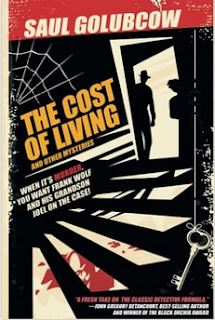Saul Golubcow is the author of the new book The Cost of Living and Other Mysteries.
Q: What inspired you to write The Cost of Living and Other Mysteries?
A: The long and winding inspiration road for my book goes back 50 years. I am the child of Jewish Holocaust survivors and grew up in a community in South Jersey of several hundred survivors.
Early on I was struck and influenced by three attributes of these courageous people who came with their broken bodies and psyches to this wonderful country and made a life for themselves, always looking to the future of their children and the Jewish people: 1) Not one survivor is the same as the other. While there are similarities in character, background, and story, each needs to be understood for each one’s uniqueness; 2) The majority did have the following in common: even though they were victims, they refused to behave like victims; 3) They insisted verbally and by their behaviors never to make victimization their identity.
I wanted to infuse this perspective in my writing, fiction and nonfiction, but the fiction took quite a while.
As I indicate in the “Acknowledgments” section of my book, in graduate school (I obtained a doctorate in English literature from SUNY – Stony Brook), I had scoped out stories about Jewish Holocaust survivors in the United States.
One such character was to be Frank Wolf, loosely based on the personality of my father-in-law. I put these notes away in a desk drawer thinking I would soon come back to them. It took 50 years, as life including raising two wonderful children happened. I taught university-level English for three years before leaving teaching and entering the business world (mortgage also happened).
During those decades I published “thought” pieces on various American and Jewish cultural issues, several that included my perspective on Holocaust survivors.
Finally a few years ago, I opened the drawer, retrieved the notes, and felt I was ready to fulfill my younger days’ mission. So I started writing stories about Holocaust survivors in the United States, and when I published a short story with Frank Wolf as Holocaust survivor turned private detective, I wanted (and encouraged by readers) to keep writing about him.
Q: How did you research the book, and did you learn anything that especially surprised you?
A: Two of the stories, “The Cost of Living” and “The Dorm Murder,” rely a good deal on memories of going to high school at an orthodox yeshiva in New York and the times I spent in various areas of the City and Brooklyn.
But when I order my psyche to “speak memory,” I spend hours looking into what’s available about the New York orthodox communities in the 1970s and New York in general during that era.
For instance, while the scene in “The Dorm Murder” of Joel’s visiting the Electric Circus relies on a vivid memory of my own visit, I needed to make sure that memory’s usual embellishments and biases are not distorting past reality. Of course I came across some distortions, but overall my memories held up well.
For “A Little Boy is Missing,” I recalled the real-life case of the disappearance and murder of Leiby Kletzky in 2011 in Boro Park and wondered how my detective, Frank Wolf, might have responded to such a situation in my switching the locale to the Williamsburg of the 1970s?
I wasn’t familiar with the Hasidic community nor with Williamsburg as I was with modern orthodox settings, so I proceeded as Frank Wolf does as a detective to strip myself of biases and stereotypes and learn about Williamsburg in the 1970s, from streets, buildings, neighborhoods and their nuances, to the makeup of the Hasidic communities themselves, constituted largely by Holocaust survivors.
I’m not sure it surprised me, but again I learned that within those communities, the survivors are distinct individuals, each with an own identity, and, in their case bending over backwards not wanting to assume victimhood as an identity.
Q: What do you hope readers take away from the book?
A: I love this question and gave it much thought before and as I write my stories.
I want my readers to enjoy a classic detective story with a thoroughly Jewish detective; to keep turning the pages as it impacts their falling asleep; to understand my perspective on Holocaust survivors; to comprehend how microcosm crimes lend understanding to horrific crimes such as the Holocaust; to have readers reflect on the meaning of “the cost of living” on many levels.
Q: What are you working on now?
A: I am working on a novel-length story that involves the murder of the wife of a prominent modern orthodox rabbi in Brooklyn with Frank Wolf asked to investigate. I, of course, can’t give you more without spoiling the plot but, also, I’m not sure I know how I will handle all ins and outs of the plot. It will probably take me a year to complete it.
Q: Anything else we should know?
A: A wonderful reader and critic of detective stories and an accomplished writer on her own, Paul Gail Benson, read my stories and pointed out that I don’t do much with women characters. I’m so glad she pushed me into confronting this lapse and admitting that I write more easily about men than women.
So in the novel I’m now crafting, women, particularly Joel’s wife and to a certain extent Joel’s mother and Frank’s daughter, play a much larger role. I hope to do well by them.
--Interview with Deborah Kalb


No comments:
Post a Comment